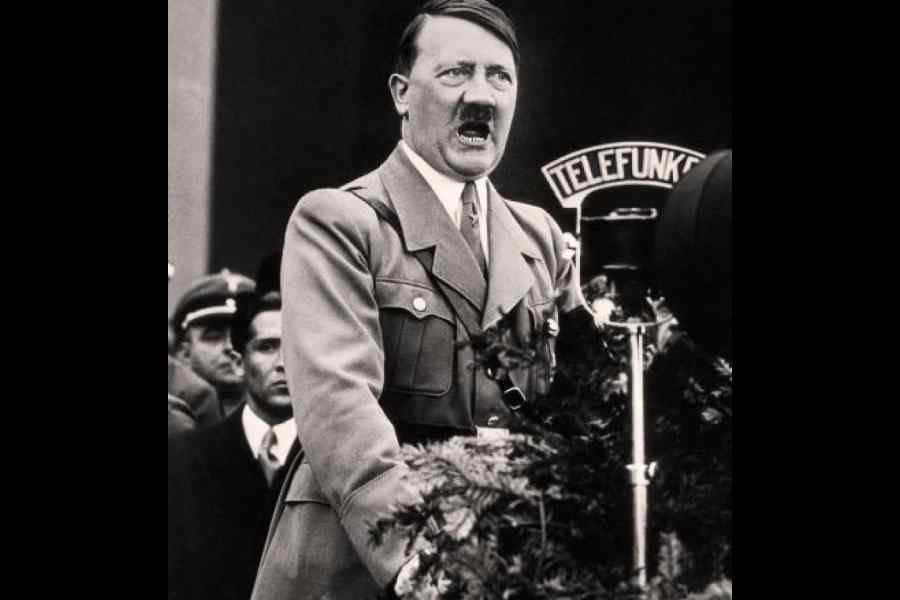TAKEOVER: HITLER’S FINAL RISE TO POWER
By Timothy W. Ryback
Headline, Rs 999
Timothy W. Ryback’s book recounts a decisive time in the life of the German dictator — the crucial months before Adolf Hitler assumed Germany’s chancellorship. Ryback assiduously traces the socio-political drifts, cross-currents and evolving, complex circumstances in the nascent Weimar Republic after the First World War that contributed to Hitler’s rise to power. His chronicling of the political state of affairs in meticulous detail exposes the failure of the democratic process in thwarting the rise of perhaps the most catastrophic dictatorship in human history.
The seeds of Hitler’s rise may be traced to the years when he joined the German Workers’ Party in September 1919. He was drawn to its hyper-nationalistic agenda and anti-Semitic ideology. Hitler also got introduced to Dietrich Eckart, the co-founder of the GWP. As an associate of the Thule Society, an occultist assemblage, Eckart was committed to the theories of racial purity and the exclusive roots of Teutonic culture. Hitler later acknowledged his mentor, dedicating the second volume of Mein Kampf to Eckart.
In a bid to expand its base, particularly among left-wing German workers, the GWP emerged as the National Socialist German Workers’ Party or the Nazi Party. In November 1923, Hitler along with Erich Ludendorff initiated an insurrection, commonly referred to as the Beer Hall Putsch. However, the rebellion, which aimed to take over the government in Bavaria, failed miserably. Tried for high treason, Hitler was sentenced to five years in the Landsberg Prison but he managed to secure an early release in December 1924.
The Beer Hall Putsch had significant consequences for Hitler and his party. Besides bringing the Nazis into national focus, it convinced Hitler that armed revolution was not the way to seize power in the Weimar Republic. Subsequently, he and his party members directed their efforts to win power through legitimate means, cunningly manipulating the political system and exploiting the democratic anomalies and loopholes.
In recounting the final months of Hitler’s ascendency, Ryback alludes to the backdrop and the principal geopolitical factors that contributed to the rise of the Nazis. These included the severe compromise of national pride manifest in the acceptance of the humiliating terms of the Treaty of Versailles; the diktat to downsize the German armed forces; the consequent destabilisation of its economy and the Wall Street crash that led to the Great Depression; the soaring inflation in the post-war period coupled with bank failures; rampant unemployment, job losses and ubiquitous poverty. Making effective use of propaganda, the Nazis vigorously exploited the economic and the political circumstances as most Germans were disenchanted with the prevalent political impasse. Riding on hyper-nationalism, Hitler’s pledge to restore prosperity and lost glory included promises of the elimination of Jewish financers and crack down on industrial strikes and street demonstrations by communists and socialists.
In the July 1932 parliamentary elections, Hitler’s party, though well short of an absolute majority, emerged as the single largest party gaining 37% of the vote. But the Nazi hopes for a majority were further dashed in November 1932 as its vote share plummeted to 33%. The dip in performance contributed to various other problems within the Nazi Party, such as the parting of ways of leaders like Gregor Strasser and Gottfried Feder, infighting within party ranks, and vandalism due to the paucity of funds.
At the same time, the electoral performance of the Nazi Party also made it difficult for Germany to be governed without giving it the requisite share of power. Hitler’s insistence on rejecting coalition politics, coupled with his persistent demand for chancellorship, set the stage for a political deadlock. The German president, Paul von Hindenburg, was equally tenacious in his reluctance to appoint Hitler as chancellor. Hindenburg finally gave in on January 30, 1933, succumbing to the persuasion of conservative politicians who erroneously believed that they would be able to control Hitler. As Ryback points out, “… less than three weeks after the March 1933 elections, the Reichstag passed an enabling law — Ermächtigungsgesetz — … establishing the Hitler government as a legal dictatorship.”
Ryback’s gripping reconstruction of the final months that culminated in Hitler’s rise to power has unique lessons for the present day as it throws light on how the masses can be deceived behind the facade of a so-called legitimate democracy.











